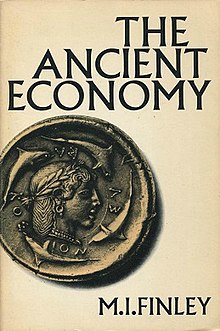 First edition | |
| Author | Moses I. Finley |
|---|---|
| Series | Sather Classical Lectures; Vol. 43 |
| Publisher | University of California Press |
Publication date | 1973 |
| Media type | Print (hardcover and paperback) |
| Pages | 222 |
| ISBN | 0-520-02436-2 |
| OCLC | 765341 |
| 330.938 21 | |
| LC Class | HC31 .F5 |
The Ancient Economy is an influential book about the economic system of classical antiquity written by the classicist Moses I. Finley.[1] It was originally published in 1973 with new editions in 1985 and 1992. Finley interpreted the economy from 1000 BC to AD 500 sociologically rather than through use of economic models (as did Michael Rostovtzeff). Finley viewed the ancient economy as largely a by-product of status, with economic relations being embedded in ancient institutions that are very much unlike those present in modern times.[2]
He viewed the ancient economy as largely stagnant since, among other things, the scope of economic action was not directed to economic or productive growth as is so often the case in modern times: technological innovations therefore went without adoption, large projects were executed for prestige rather than practical benefit, and economic development, or profit maximisation.[3] Such views, and the uncritical acceptance of elite ancient writers' economic mentalités, have been challenged and overturned by archaeological discoveries through the late 20th century.[4]
- ^ Launaro 2016, p. 227. "It is very difficult to overstate the impact of Finley's The ancient economy".
- ^ Launaro 2016, pp. 238–39.
- ^ Greene 2000, pp. 35 (technological non-adoption), 39 ("more than just prestige in mind when designing [the Pont du Gard]"), 40 (no indications of economy of effort), 43–45 (non-investment in production).
- ^ Jew, Osborne & Scott 2016a, pp. 7–8. "In the case of The Ancient Economy... the scholarly world [tried], for a generation, to substantiate the claims that Finley made before generally concluding that the taks was vain and that neither ancient evidence nor coherent argument supported his view".
